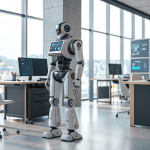The rise of AI has sparked passionate debates across age groups, with younger adults seemingly more divided on the issue. From fears of job replacement to ethical concerns, generational perspectives on AI reveal fascinating insights into how different age groups adapt to disruptive technologies.
A Reddit discussion recently explored these generational divides, with the original poster (OP) observing that younger adults, particularly Gen Z, often display stronger negative emotions toward AI compared to older generations. The OP noted that younger individuals frequently cite concerns such as environmental impact, job security, and ethical implications, while Gen X and Millennials tend to be more accepting or indifferent.
One user, a tech writer and musician, shared a nuanced view. While they embrace AI for its creative potential, they’ve witnessed resistance in the art community. Their son, a full-time artist, avoids AI altogether due to the stigma associated with AI-generated art. “It’s toxic,” they explained, describing how artists face accusations of using AI even when they don’t. Social media backlash and the fear of being “canceled” have created an environment where the relationship between AI and art is fraught with tension. For a deeper exploration of how AI is transforming industries like art and media, check out our curated AI product reviews.
Conversely, younger users who support AI highlight its benefits in productivity and personal growth. A 23-year-old Redditor credited tools like ChatGPT for helping organize thoughts and brainstorm ideas, describing it as a judgment-free assistant. They argued that AI isn’t inherently bad but requires proper regulation to prevent misuse. For more insights into the societal impact of AI, visit our expert opinion articles.
This generational divide may stem from differing levels of exposure and stakes. Older generations, often established in their careers, may see AI as a tool to enhance efficiency rather than a threat. Meanwhile, younger adults, entering competitive job markets, might perceive AI as a direct competitor. Industries like art and media have already seen AI tools reshape workflows, intensifying these fears.
However, the divide isn’t absolute. As one commenter pointed out, “Adaptation is key. You can either embrace the tools or risk falling behind.” This sentiment echoes across many industries, where professionals use AI not to replace human creativity but to augment it.
For Gen Z, the challenge lies in balancing skepticism with innovation. AI tools like Stable Diffusion or LangChain can empower users to create and innovate, but the fear of losing autonomy remains a valid concern. This duality captures the broader conversation about AI’s role in society: a source of both opportunity and unease.


